Was Mass Effect’s Illusive Man the architect of his own downfall?
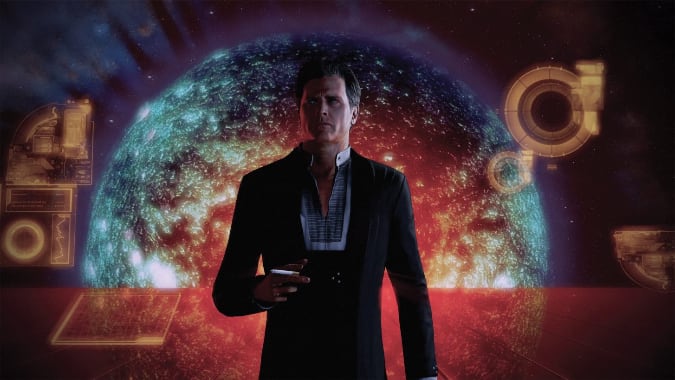
I’ve been ruminating on the events of Mass Effect 2 and 3, and the more I do, the more that I believe there’s a mysterious shadow conspiracy at the heart of the Mass Effect trilogy. And that conspiracy is headed up by someone simultaneously the most and least likely culprit: the Illusive Man. Most likely because labyrinthine conspiracies are more or less his entire thing, and least likely because this conspiracy isn’t one you would have expected coming from him.
So let’s break down this Mass Effect conspiracy theory, and talk about the Illusive Man, the Reapers, and the strange, subtle process of indoctrination.
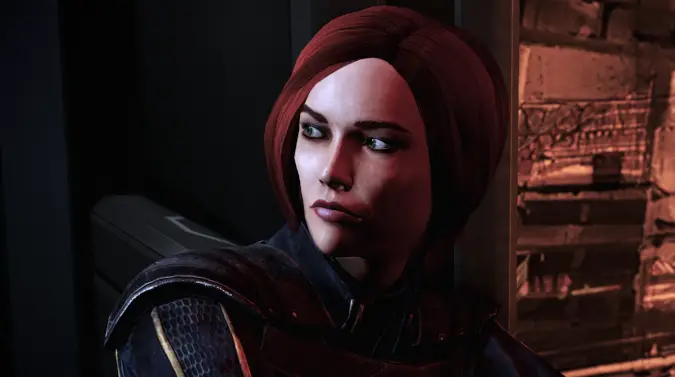
Jack Harper, who would become the Illusive Man
To give the full history of the man who would become known mainly by a pseudonym would require more space than we have here, but the Illusive Man’s appearance in Mass Effect: Evolution sets the basic facts. He was Jack Harper, a mercenary working for General Williams on Shanxi during the Turian occupation of the planet. While Williams was considering evacuating Shanxi, he sent Jack and his squadmates Ben Hislop and Eva Core to find out why the Turians were seemingly searching for something on the planet.
This led to a confrontation with General Desolas Arterius, who was seeking what turned out to be a Reaper artifact, although none of the people involved knew that at the time. Jack was exposed to the artifact, as was his friend Ben, and in the process both men were changed: Ben was essentially enslaved by it, while Jack’s transformation was more subtle. Desolas Arterius and his brother Saren — yes, the same Saren you have to defeat in Mass Effect 1 — brought the artifact back to Palaven, where they intended to use it to create a race of “meta-Turians” improved by the artifact’s technology. But after his exposure Jack could understand the artifact and knew it wasn’t a means to improve the Turians exposed to it — instead, it was warping them, changing them in an attempt to convert all life for a purpose all its own.
But Saren was convinced of the artifact’s threat and told Palaven command that a unique bioweapon was loose on the planet. Ben and Desolas were ultimately killed, Eva gravely wounded, and Jack escaped with the certain knowledge that there were dark forces in the cosmos that could warp and enslave others’ minds… and which sought nothing good for humanity.
Jack also began to feel the effects of the device in himself. Not only could he understand the whispering messages of the strange alien technology, his eyes began to change and glow. While recovering from the experience, he wrote a manifesto and began the work of creating what he saw as humanity’s best line of defense against threats like the artifact.
Jack Harper’s new crusade would become Cerberus.
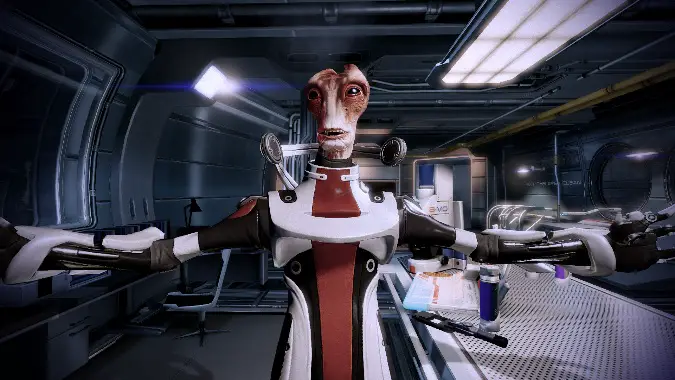
Reaper indoctrination is slow, subtle, and eventually all-consuming
It’s clear that the Illusive Man was going through indoctrination from the moment he interacted with the artifact on Shanxi. But unlike Ben, he remained aware of the artifact’s true intentions — it was inimical, and sought not apotheosis but subjugation for an unknown purpose. Ben fell under the artifact’s control, as did the various “meta-Turians” Desolas created using the artifact. The man who no longer called himself Jack Harper saw this — he commented to a dying Eva Core that the artifact had made him lose sight of what really mattered.
So what, exactly, was his master plan? Was it simply to seize control of Reaper technology, or did he have another goal in mind? His obsession with mastering the ancient secrets of the artifact on Shanxi — eventually expanding to include all things Reaper, as seen in Mass Effect 3 — was almost certainly a product of indoctrination. By the end of the video games, he’s barely recognizable as human. It’s not just his eyes: tendrils of Reaper tech extend up and down his face from some combination of exposure to Reaper tech and self-experimentation. The Illusive Man believed using Reaper tech to improve humanity was the way to defeat them, and thus this was the apex of human evolution.
But that’s exactly how Reaper indoctrination works: by convincing its victims that what it wants is what they want. This is likely similar to the way Protheans started down the path towards becoming Collectors. As Mordin Solus put it, no soul…. replaced by tech.
Throughout the series, we see how ruthless Cerberus is. The organization is divided into task-based cells: each cell pays attention to its own tasks, and reports directly to the Illusive Man. He’s collected a talented group to run these cells — and insure his orders are obeyed — including Miranda Lawson who serves with Shepard on the Normandy SR2; personal assassin and bloodhound Kai Leng; Agent Rasa, who plots to overthrow Shepard with the help of a clone; and talented strategist General Oleg Petrovsky.
But when the Reapers reveal themselves by attacking human colonies, the Illusive Man doesn’t send any of his top agents to deal with the matter. Instead, he turns to Commander Shepard, an Alliance hero who’s recently deceased — but death doesn’t matter much to an organization like Cerberus which seems to believe that the end justifies the memes.
So why does the Illusive Man single out Commander Shepard, and why does he specifically and directly order Miranda not to implant any form of control or coercion in Shepard during the Lazarus Project?
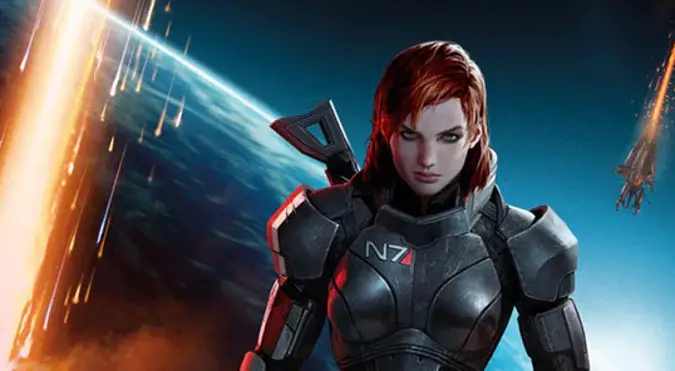
Is it possible to resist indoctrination? Maybe.
Shepard is a gifted combatant, an excellent leader, and a skilled tactician. Shepard managed to do what Harper never could and actually stopped Saren Arterius. Shepard proved highly resistant to Saren’s arguments about the necessity of working with the Reapers to preserve organic lif, and despite several exposures to Reaper technology never accepts the idea that the Reapers should be served, worked for, or even co-opted. It is this quality — the resistance to the idea at the very heart of Reaper indoctrination — that sets Shepard apart. And Shepard doesn’t just resist Reaper indoctrination, they even resist the mental domination of the Leviathan, the race that originally created the Reapers.
When Shepard dies during the Collector attack, Cerberus spends billions of credits to return them to life. Why spend so much money and so many resources to bring back one soldier? The Illusive Man says it’s because he knows Shepard can get the job done, defeating the Collectors — and letting the Illusive Man claim their technology, Reaper technology. I believe this obsession with Reaper technology, and the idea that humanity can be improved by it, is a sign of the Illusive Man’s deepening indoctrination.
But we saw with Saren that people who are intelligent and tenacious enough can resist indoctrination. Saren set up research facilities to study the indoctrination process, to better understand (and avoid) it — his studies didn’t save him, but Saren was fully aware of the risks of indoctrination and did what he could to avoid them. Throughout the Mass Effect series, Commander Shepard is exposed to multiple Reaper devices and never once yields. So it must be asked: what if Shepard is the Illusive Man’s attempt to avoid indoctrination? And even if he can’t avoid indoctrination, Shepard is perhaps the only person he can count on to stop him — or stop the Reapers from using him.
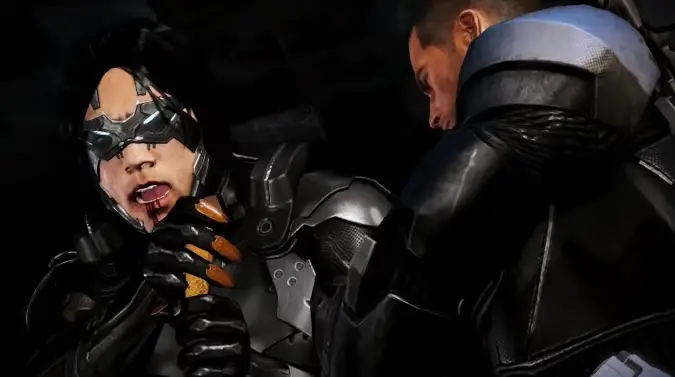
How the Illusive Man engineered his own defeat
Look at the organization of the Lazarus Cell that brought Shepard back to life and went on to defeat the Collectors. It’s full of sympathetic faces that aren’t the average Cerberus fanatics that Shepard has encountered before — and these teammates are the key to convincing Shepard to work with the Illusive Man. There’s Kelly Chambers, a highly empathic, extremely approachable person, tailor-made to humanize Cerberus. Jacob Taylor, who has his doubts about Cerberus and expresses them openly. Miranda Lawson, who starts out as a true believer but is ultimately swayed to Shepard’s point of view. The Illusive Man even goes so far as to recruit old friends who will always be more loyal to Shepard than to Cerberus, including Flight Lieutenant Jeff Moreau and Dr. Karin Chakwas, both of whom served with Shepard on the Normandy SR1.
And as Shepard builds out their team — with the help of carefully-vetted dossiers from the Illusive Man — it becomes even less a of a traditional, loyal Cerberus operation. There’s Mordin Solus, a genius and former STG member with no loyalty to a human supremacist organization; Subject Zero (aka Jack), who actively hates Cerberus for what they did to her as a child; and Samara, a Justicar who would kill anyone in a heartbeat if she saw them behaving dishonorably. Even more old friends show up, with Tali’Zorah vas Neema and Garrus Vakarian, neither of whom are fond of Cerberus, but both of whom are loyal to Shepard after working with them to take down Saren in Mass Effect 1. If you wanted to give Shepard a galactic dream team — with no loyalty whatsoever to Cerberus — this is how you’d do it.
And all the rank and file Cerberus we see on the Normandy are basically central casting clean cut kids — they’re eager and willing to do what it takes to stop the Collectors and save humanity. Even Garrus and Tali make a point of saying how the crew has been welcoming to them both, despite their not being human. This is far from the Cerberus players encountered in ME1, which performed brutal, unethical experiments and murdered anyone who looked too closely at their activities. And if you think Cerberus’ behavior in ME1 was an outlier, by the time Mass Effect 3 comes around we see General Oleg Petrovsky in Mass Effect 3 experimenting on Adjutants and setting them loose on the civilian population — this is hardly a changed group.
So why did the Illusive Man recruit Shepard and help them build the ideal Cerberus-fighting squad? Because the Illusive Man is afraid he’s indoctrinated, even as he refuses to believe it. He knows that he’s smarter and stronger than Ben Hislop was. He knows he’s no puppet, being guided by indoctrination. And to prove it to himself — to ensure it — he set a plan in motion to ensure that he won’t be able to do the Reapers’ bidding.
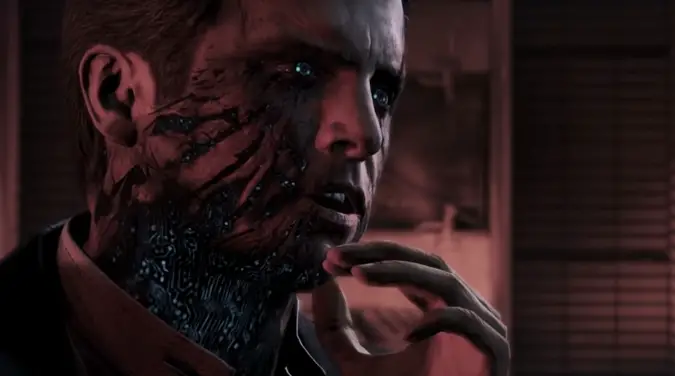
The Illusive Man always hid who he was, especially from himself
Everything we see in Mass Effect 2 seems calculated to cause Shepard to distrust Cerberus and the Illusive Man while also building a crew that’s totally loyal to Shepard. There are the obvious spy cameras and monitoring devices (that EDI even tells Shepard about if asked), the Illusive Man deliberately sending of Shepard into a trap to foment distrust, the hand-picked team of fresh-faced operatives — heck, the Normandy SR2’s engineers were literally recruited because they spoke out in defense of Commander Shepard when the Alliance brass dismantled everything Shepard had done after the Commander’s death. This isn’t a Cerberus ship: it’s Shepard’s ship from the very beginning.
If Karin Chakwas survives into Mass Effect 3, she says that she doesn’t feel guilty about working for Cerberus: We didn’t work for them, we used them… We took their money, took their best people, took their best ship.
And it’s entirely possible — perhaps even likely — that the Illusive Man would only have agreed, but also approved of the sentiment. By the end of ME3, the Illusive Man is a warped reflection of his one-time foe Saren. We see Reaper tech crawling up his face, and it’s clear that his mind no longer his own. But before he fell to indoctrination, did he deliberately set up a safeguard by bringing back Commander Shepard?
I believe he did. I believe the Illusive Man poured billions into the Lazarus Project not because Shepard was a skilled soldier, or a gifted leader, despite both those things being true. No, he picked Shepard, instead of any other skilled, loyal, dedicated agents — instead of Kai Leng, instead of General Petrovsky, instead of Miranda Lawson or Maya Brooks or even a clone that he could have easily controlled — because the part of him that was still human didn’t want the Reapers to succeed. That meant finding someone who was a skilled soldier and gifted leader who s would easily turn on Cerberus if the Illusive Man fell to indoctrination.
And in the end, the Illusive Man got exactly what he paid for as Shepard broke away from Cerberus and started to systematically destroy the entire organization. In the end, Shepard was the Illusive Man’s insurance policy, his final answer to indoctrination: someone who would certainly stop him, and who had all the resources to do so.
Please consider supporting our Patreon!
Join the Discussion
Blizzard Watch is a safe space for all readers. By leaving comments on this site you agree to follow our commenting and community guidelines.
 @MatthewWRossi
@MatthewWRossi



